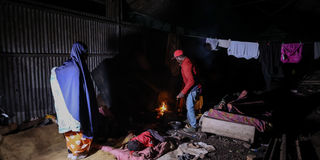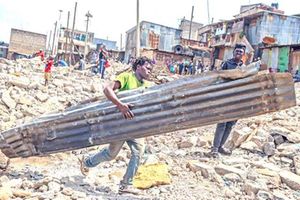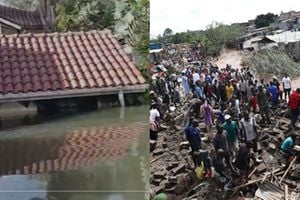
Residents of Mukuru Kayaba in Nairobi left without shelter after their homes were torn down, leaving them with no choice but to spend the night outside on May 19, 2024 after the government ordered the demolition of structures and buildings illegally constructed along riparian land near rivers.
On a Wednesday afternoon, Mr Samuel Mutinda is working in his small jua kali yard in Nairobi’s Mukuru slums.
Unlike other days, Mutinda’s workforce has been reduced to a few men who are tirelessly working to meet the needs of his many clients.
A few months ago, the yard had a large number of young men drawn from the expansive slum who were working as casuals. But their numbers have now reduced to a small fraction. Why? He says it's because of a recent demolition exercise that led to the loss of his livelihood.
Apart from owning the yard, Mutinda is also one of the hundreds of residents in Kayaba whose lives have been turned upside down following a demolition exercise that took place a few months ago.
On the fateful day, a tearful Mutinda says a contingent of youth arrived and vandalised more than 50 rental structures at Budalang’i and Crescent area in Mukuru-Kayaba Slum.
He had owned the structures for the past few years and used some of the earnings to open a jua kali yard.
“The police officers just stood there watching on that day. I built everything through hard work but I lost it in a few seconds. I lost everything and it has been difficult for me to pick the pieces up and rebuild my life,” Mr Mutinda told Nation.Africa.
A few metres away, Ms Regina Waswa, another resident sits pensively on the edge of the river.
She, among other residents, was a victim of the demolition exercise initiated by the government in May this year.
Nowhere to go
Ms Waswa told Nation.Africa the biggest impact in her life was the demolition of her two-roomed house and the disruption of the learning process for her two girls.
“They have nowhere to go and I have nothing to do. I will have to travel home, I have gone through a lot since there is nothing that I can do,” she said.
She also claims that a Sh10,000 that was donated by the government did not reach her.
“We received the announcement but unfortunately we did not receive funds. We are asking where this money goes but we have never been told,” she adds.
On May 3, 2024, the Interior Ministry ordered the demolition of structures and buildings illegally constructed along riparian land near Nairobi following heavy floods witnessed in Kenya in April and early March.
The directive affected all those living within 30 metres of the Ngong, Mathare, and Nairobi rivers.
Those affected included residents in Mathare, Starehe, Embakasi South, and Makadara sub-counties where most of the slums are located.
Apart from impacting the parents who will now have to find alternative places of residence, Starehe Deputy County Commissioner, John Kisang, told Nation.Africa where more than 3,000 learners were affected after more than 10 schools were demolished.
Some learners are also yet to be traced as families moved to other slums while others travelled to their rural homes.
Despite assurances from government officials that no one would be spared in the demolition process, a spot check at various locations near rivers in Nairobi revealed that some were spared.
Along the Industrial area, several factories have their perimeter walls inside the banks of the river.
Industries at Kariobangi Light Industries and factories in the Industrial Area have their perimeter walls right inside the Ngong River but were not demolished.
A few metres away at Riverside Area in the Soweto slum, structures located more than 30 metres and including up to more than 200 metres from Ngong River have been flattened.
In the Parklands area in Nairobi, several houses have also been constructed on top of the Kibarage River, which is a tributary of the Mathare River.
A spot-check by Nation.Africa along the river reveals that part of the water from the river is diverted to allow for the construction of high-rise apartments.
Posh estates in Nairobi especially in Runda and Kileleshwa, which are also located near the river were spared in the demolition process raising questions about the objectives of the demolition exercise.
In the Kileleshwa area where the Kisichwa River that drains to the Nairobi River is located a new mall has been constructed a few meters from the river.
It is also at the same spot where in 2018 the National Environmental Management Authority (NEMA) demolished structures, including a Java restaurant and a Shell petrol station, at the same spot for encroachment on riparian land.
At the Grogan area along the Nairobi River, a chain of shops especially selling motor-vehicle spare parts dealers and garages have also been spared from the demolition.
A visit to the area reveals that most of the business owners are oblivious to the demolition exercise.
Mr Franklin Otieno, who owns a garage in the Grogan area, says they are yet to receive information on the demolition.
“These are businesses that we have owned for a long time. It has never crossed my mind that it would be demolished. We heard about the demolitions and we had to ensure that we were keen. We haven’t yet heard that our shops will be demolished,” Mr Otieno told Nation.Africa.
A section of the residents affected by the demolition are now leading malice in the whole process, seven months later.
A lobby group of more than 500 Nairobi bishops now says that the government erred by disrupting the lives of hundreds of poor residents in the slums.
“These residents in slums are Kenyans. The exercise was done politically and therefore asked the anti-graft agencies to re-look at this. As clerics, it is our mandate to correct the government where it goes wrong. Why choose to demolish houses in the slums yet houses in riparian land are elsewhere in posh estates?” Dr Josphat Njoroge, a cleric posed.
But Environment Cabinet Secretary Aden Duale dismissed claims that only informal settlements were targeted during the demolitions of houses built on the riparian land saying there were no sacred cows during the exercise.
While appearing before the National Assembly Committee on Environment, Forestry, and Mining, Mr Duale insisted that demolitions were conducted across all areas where houses and structures were built on riparian land near Nairobi, Mathare, and Ngong Rivers.
"I want to give an assurance before this committee that we are not discriminating. The Nairobi River, for instance, spans 47 kilometres, and so far, we have covered 27 kilometres," Mr Duale said late last year.
"All those living along riparian land across the city of Nairobi must vacate regardless of their social class. The flooding witnessed in Nairobi County led to the loss of 41 people and I want to assure this Committee that this will not happen again. In the next 18 months, the Nairobi River will be something to be happy about. This is not my commitment but the president's commitment", he added.
The exercise, he said, will continue and will also target churches, mosques, and factories along the banks of the river.
"Whether you have built a church or mosque on riparian land, we will demolish them—no matter how big you are, we are coming for you," he vowed.
The CS had been summoned by the committee led by Nakuru Town East MP David Gikaria following complaints raised by three MPs from Nairobi that the government is selectively targeting informal settlements in the demolitions.
The lawmakers, Antony Oluoch (Mathare), T.J Kajwang (Ruaraka), and Amos Mwago (Starehe), had queried why the evictions were only taking place in low-income areas warning that the 30-meter eviction guideline would displace large numbers of their constituents.
Mr Oluoch and Mr Kajwang’ had appeared as friends of the committee to voice the concerns of their constituents about the exercise that was sanctioned by the cabinet.
"Where does the Nairobi River start and end? Why did the demolition only occur in slum areas where our constituents live but not in posh estates like Kileleshwa and Runda? Are they lesser Kenyans? It’s unfair for this government to discriminate against, torment, and torture our people simply because they live in informal areas," Mr Oluoch lamented bitterly.
The MP warned that enforcing the rule that all houses built 30 metres from the river would destroy entire neighbourhoods like Mabatani and Hospital Wards in Mathare Constituency.
"Every metre means lives are affected," Mr Oluoch added.
Mr Kajwang’ proposed that the exercise be halted until “all parties agree on how to conduct it more humanely.”
But on Sunday last week, speaking on the issue when he attended a church service in Nairobi, President William Ruto reiterated his government’s resolve to clean the Nairobi River.
“It’s unfortunate that Nairobi River is a sludge as sewer lines pass underneath some sections of it. It also gathers waste as it passes near the city centre and residential areas.
“Give me this year and next, I assure you Nairobi River will be clean,” he said on Sunday, January 12, when he addressed worshippers at United Pentecostal Church in Dagoretti North Constituency.
President Ruto promises that before the end of this month, his administration will finalize a contract to roll out what he termed as the ‘modernization of Nairobi River’.
He said that programme will, among others, include the construction of walkways along the river for usage by residents of the city.
“I want to assure you Hon Oluoch that Mathare which was the most affected by last year’s demolition will be the greatest beneficiary of the improvement of Nairobi River Basin,” said Dr Ruto.
“My administration is doing this because Nairobi is the face of Kenya and it cannot be left behind as we progress,” he added.
Reporting by Ndubi Moturi, Sammy Kimatu, and Charles Wasonga









